
Atlas F1 Magazine Writer
The first four races of the 2003 season have asserted Mark Webber's talent in Formula One. Few, if any, would bet against him becoming one of the leading stars of F1's new generation, and the amicable Australian knows that. David Cameron analyses Webber's success in and out of the car, as he talks to those around him, and the driver himself
He thinks about warm up, and he knows he's got to be careful at the chicane - if he's too aggressive he'll lock up and lose time, but if he's not aggressive enough he'll lose time there anyway. It's a fine line. He's got to beat 1:23.1, which was what he figured on before qualifying, and he's got the speed in the car to get there if he's on top of his game. He drags his brakes a bit where he can, after Acque Minerali and Variante Alta, to put some heat into them for the fast lap, and he starts to pick up the pace at last, aiming for the start line.
He eases the car out of the pits while the world feed is at a commercial. He's got time on his side because of the break, and he's going to use it. He runs slower around the track than any other driver on his outlap - it feels like it's crawling to him, but he's got a plan. He's running slowly now to protect his tyres for the next lap, the fast one - if he nails it there's a tenth of a second in it for him, and in qualifying that's all the time in the world. He nurses the car around, checking his instruments and keeping an eye on the tyre pressures - if the pressure changes this could all be for nothing.
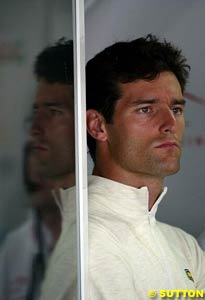 He didn't come from nowhere, but sometimes it seems that way. A few exceptional qualifying sessions in a car that no one was expecting anything from have suddenly thrust Mark Webber into the Formula One spotlight after a tough debut year in perennial back markers Minardi, following the trail previously blazed by his good friend Giancarlo Fisichella and Renault's Jarno Trulli.
He didn't come from nowhere, but sometimes it seems that way. A few exceptional qualifying sessions in a car that no one was expecting anything from have suddenly thrust Mark Webber into the Formula One spotlight after a tough debut year in perennial back markers Minardi, following the trail previously blazed by his good friend Giancarlo Fisichella and Renault's Jarno Trulli.
A Minardi drive is a double edged sword - it's a seat in Formula One, and it puts you into the game and in front of the world, but the team usually struggles for performance against the others, which can lead people to think that the driver isn't up to the task. Webber claimed a fifth place result on debut in an incident-filled race in Melbourne, but it's probably his later drives that got him noticed by the movers and shakers of the paddock, where he took the battle to more highly favoured drivers. "I was very determined to make a massive effort to prove that I can do a good job and be taken seriously," Webber recalled in the Jaguar motorhome after qualifying fifth in Imola. "You don't see it at Minardi - you can drive so well there and no one sees it."
"You've just got to keep grounded. I had a lot of better drives at Minardi than Melbourne from a driving front, because I didn't have the car under me to push really. But then you go to races like Monaco and Magny Cours where I could push much more - I didn't get any points but they felt like better races to me, and that's a victory for Minardi in that sense." A victory for Webber too - his performances were noticed by then Jaguar team boss Niki Lauda, whose cars were being humbled by the young Australian. Lauda brought Webber into his team, and it has been paying dividends ever since.
Webber is under no illusions as to the difficulties he faces at Jaguar, the subsidiary of motoring giant Ford, which has been floundering more or less since the team's debut in 2000. The car's problems were apparent from his first test with the team last year. "I think the car last year had a lot of trouble on entry in high and medium speed corners," Webber states, "and when you've got that problem you have to make a lot of changes mechanically to calm that problem down, which means you have to sacrifice a lot and it hurts the lap time in the end."
Like his famous compatriot Alan Jones, Webber seems to revel in mixing in with the team to just get the job done, and constantly gives them credit for progress made - you can sense that he really feels like he's just another member of the team, with his feet on the ground and his eye on the prize. "Yeah, the guys have done a good job at understanding the problems we had last year and it's not easy," says Webber. "The progress we have made has been outstanding, I feel; it really has been good. But we've still got a long way to go.
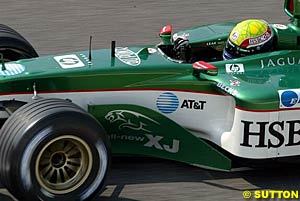 "We've still got a lot to improve on, but we've had a lot of good medicine in the last few races. Okay, we still haven't got any runs on the board, we don't have any points, but internally with the boys, with the team, it's just what we needed - we've been through a tough winter, and hopefully we can get a few points now."
"We've still got a lot to improve on, but we've had a lot of good medicine in the last few races. Okay, we still haven't got any runs on the board, we don't have any points, but internally with the boys, with the team, it's just what we needed - we've been through a tough winter, and hopefully we can get a few points now."
He's shining in qualifying, of course. The car is fast but fragile, which most drivers would prefer to the alternative, and given the car problems he's suffered in the races qualifying is where he is making his name for the moment. I asked John Hogan, Jaguar's new sporting director, if being outqualified by his teammate for the first time ever in Malaysia spurred him on to improve - he laughed and said that sometimes those are the things that get under a driver's skin. Webber, of course, had a more prosaic response.
"Well, in Malaysia we had different tyres to start with - he (Pizzonia) was on a soft tyre, I was on a hard tyre - so there's always reasons for it. If your teammate outperforms you in the same car with the same tyres and the same fuel load then it's a fair battle. I wasn't too disappointed with Malaysia - I still want to improve a little bit myself on the performance front, but I was on a hard tyre which is much much stronger for the race."
Which brings us to one of the problems arising from new qualifying regulations - it's much more difficult to appraise the relative performances of teammates. "It is a bit tougher compared to the old system, sure," agrees Webber, "because even now you get guys going out on a Friday with the same fuel loads, but things can be deceptive because of track grip and all sorts of stuff. Some teams you know here might hedge their bets either way on a three or two stop strategy, but it's hard to say. You might say Kimi [Raikkonen] and [David Coulthard] are on different strategies, except that DC locked up, you know - they're probably on the same fuel loads. I don't think it's a very good habit for teams to run different fuel loads."
He's at speed across the start line, fast and smooth towards and through Tamburello until the chicane. His line is wrong there, running slightly off and then onto the power too quickly mid corner. He regrets it instantly - it's what he said he wasn't going to do. But the lap is long and there's still time to make it up, and he's back onto the racing line and flying. Through sector one and he's 23.962 - almost four tenths down. There's work to be done.
Niki Lauda was at Imola for the race, the ghost of Christmas past as far as Jaguar's management is concerned, but when asked about Webber's performance this year his famously curt responses were betrayed by the smile of a proud father. "I employed him because I was sure he would do the job, and that's what he's here for. He's doing very well. It means that the choice of Mark was the right one, because he really delivers, and the car is a really good car - Mark qualified ahead of McLaren."
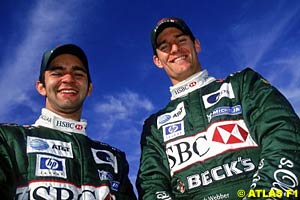 Despite the (now usual) dramas at the start of the year at Jaguar, Lauda is very proud of the achievements made by the team this year. "I was responsible to build the car, I was responsible to employ the drivers," Lauda stated, "so for me I am very happy because everything is going in the right direction. My target was to qualify in the first ten for every single race; Mark now is fifth, so he's doing very well."
Despite the (now usual) dramas at the start of the year at Jaguar, Lauda is very proud of the achievements made by the team this year. "I was responsible to build the car, I was responsible to employ the drivers," Lauda stated, "so for me I am very happy because everything is going in the right direction. My target was to qualify in the first ten for every single race; Mark now is fifth, so he's doing very well."
DC: Your decision to pick him up certainly paid off for Jaguar
Lauda: "I have to ask myself, because I'm always very critical of myself, did I do the right job? But I think I've seen what happened, because the car which is there now is my car. Nobody of this new management has done anything to it, because I started this racing car last June. I certainly was responsible for it. I chose the drivers, I was responsible. I could say it was the perfect next step which has to be, like I said, you must qualify in the top ten to be able to finish in the points."
The problem for Lauda, of course, is that he doesn't know what the future holds for the team, as he's no longer involved in any way with it. "It will all depend on how the new management now can bring the car forward," he notes. "Now you have to see what the next step is going to be. So I am not aware of what they are going to do or what the programme is, of which is exactly the next step."
Which brings us to the new management. I asked Dr Mark Gillan, the Head of Vehicle Performance for Jaguar Racing, if he thought they had the bargain of the season in picking up Webber's contract. "Mark is the surprise of the season," Gillan agreed. "He is both quick in the car and a professional out of it. Certainly he is a core member of the team and well respected throughout the paddock."
DC: He must have well and truly lived up to your expectations so far
Gillan: "Yes, and gone beyond them. His performances in qualifying and in the race have been inspirational. His professionalism is outstanding and this is both in and out of the car."
DC: Ross Brawn famously remarked in 1997 that the true benchmark of the Ferrari was Eddie Irvine's times, and that the rest Michael Schumacher found was down to his skill - could a similar conclusion be drawn from the times of Pizzonia and Webber with regard to the R4?
Gillan: "No, Mark's pace in the R4 has been consistently quick and this is a true reflection of the car's pace. In fact, during qualifying in Imola he drove within his limits in order to get the car home safely."
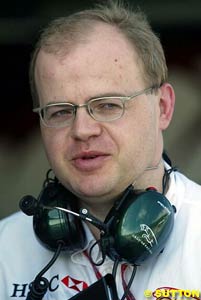 DC: So where do you think the difference in time between your drivers comes from?
DC: So where do you think the difference in time between your drivers comes from?
Gillan: "Lack of experience is definitely an issue for Antonio, we must remember that he has had far less time behind the wheel of the R4 and less knowledge of the circuits on the calendar this year."
DC: Jaguar has suffered from a lot of unreliability this year - what steps are in place to rectify this situation?
Gillan: "Our long term goal is of course to increase reliability, but this does not happen overnight. It takes time to change the infrastructure of any company and with our changes in management we are moving in the right direction. We are changing our working practices and concentrating on the quality of our parts."
You can see why Webber is thriving in Jaguar - the heads down, no nonsense approach to motor racing seems to run throughout the company.
But I have to ask; has the team set goals for their position on the points table for the end of this year, and have they been changed given the remarkable improvement in qualifying recently?
"We aim to gain respect and compete competitively in the midfield," comes Gillan's reply. "This was our goal at the beginning of the season and it remains our goal."
Flavio Briatore has done a lot of work to get Webber into Formula One, and it seems to be paying off now. He's obviously a busy man, as any team boss should be, and as such he has delegated a lot of Webber's day-to-day management to Ann Neal, Webber's personal manager. Briatore is proud of the driver's achievements, though, and knows that his faith is being repaid. "He's very good," Briatore states, "it's his first year in a competitive car and he's done a very good job, and I believe he's one of the surprises of Formula One, and he'll keep doing it like that." There seems to be so much potential in him, I tell Briatore. "Absolutely," he beams. "He's just getting better and better."
The Piratella is next, and the Imola curbs are tall and ominous. Too far over them and you can break your suspension, too far away from them and you're losing time. He nails the corner, runs smooth down to Acque Minerali and nails that too. The lap is coming back to him, getting faster as he goes. The sector two split is 51.718 - he's plus 0.2. He's bringing it back.
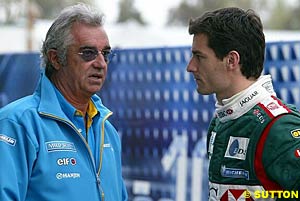 After the race, of course, the mood in the Jaguar motorhome is more downbeat - Webber was plagued with bad luck throughout, from the launch control problems both drivers suffered, to the pit lane speed limiter failure to the eventual drive shaft failure which finished his race for him. It's not always down to the car of course - Webber lost a point scoring result in Brazil when he destroyed the car while trying to keep his degrading intermediate tyres together by running through some water on the track, an understandable but costly error on his part.
After the race, of course, the mood in the Jaguar motorhome is more downbeat - Webber was plagued with bad luck throughout, from the launch control problems both drivers suffered, to the pit lane speed limiter failure to the eventual drive shaft failure which finished his race for him. It's not always down to the car of course - Webber lost a point scoring result in Brazil when he destroyed the car while trying to keep his degrading intermediate tyres together by running through some water on the track, an understandable but costly error on his part.
Nevertheless, Imola was seen as an acid test for the team before the race, as the circuit layout is favourable to the car - so has it lived up to expectations, the car problems notwithstanding? "Yeah," Webber acknowledges, "and it was a good indication as we saw so many others pitting before us, you know, and Ralf pitting one lap after us. There were a lot of things that were again encouraging. It's not easy to remain positive in these times, but we put our stake in the ground a long way out there today, so we want to have a very very strong result - it's very easy to fall short of that expectation. We fell well short today, but it's still a long season. You'll see a party here shortly."
Where to from here for the team? "There might be a few circuits where we might have some difficulty in being really, really fast," Webber states. "Like the next Grand Prix could be quite tough for us, [Barcelona] is a massively demanding circuit on aero, on efficiency, all sorts of stuff. Our aero has come on leaps and bounds, it's very, very good, but we have to remember where we were six months ago and we also have to be careful that our goals don't change very very quickly.
"I don't want to be mean, but if you look at the overlays of what Eddie did last year with the same fuel load, we're 3 seconds quicker. 3 seconds! And okay tyres, new car, all that stuff, but the guys have done a really good job. It is a bit of an acid test here, and Brazil, but there are some tracks that we can really do well at."
Of course Formula One never stands still, and Webber is aware enough to know that there is a lot of work still to do, despite the progress made this year. "There are areas we can improve on," he notes, "and we are chipping away at it. We're going to have a three-day test next week, which is good for us. I'm not going to sit here and tell you what our weaknesses are, but we know what they are and we're going to work on them for the next few months and see where we are."
DC: Jaguar are one of four teams who have foresworn unlimited testing during the season, of course. Can the Friday testing schedule actually help improve the car over a season?
Webber: "I'm not sure - if you do it officially then you still can look quite good actually. Test mileage is always [good] to get on top of problems, and we don't do the mileage of McLaren - they're on top for a reason - but things can come along hopefully over the year. We'll just chip away - we don't have any new car coming; we're just laying the foundations for improvement, and the foundations are hopefully coming into place - we're in the top five already."
DC: It must be hard to remain so motivated with all the reliability niggles though, surely?
Webber: "The last few races have gone really well for me. I've got a lot of trust in the car, and we're competing with people we weren't even thinking about - they are months ahead, you could argue they are 8, 10 months ahead of us - and it's very satisfying to me. I've worked very hard, kept my head down, and I'm happy with my career - the hard work is paying off. Things happen for a reason, and when the going gets tough you're stronger for it. Now, when you have a hard day at the office, it's like water off a duck's back - you've got to bounce back the next day, and maybe some of the younger guys struggle to do that because they haven't got the depth, haven't had the knocks for it."
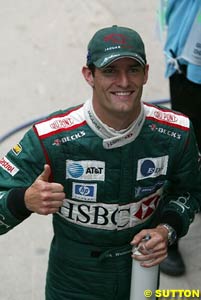 The current benchmark for the drivers is Michael Schumacher. Throughout his career his pronouncements on the other drivers in the series are taken by the media and people around the world as an indication that they have made it into the big time. Schumacher has been saying a lot of positive things about Webber lately, which must be a thrill for the man who famously has all of Schumacher's wins on videotape back at his parents' home.
The current benchmark for the drivers is Michael Schumacher. Throughout his career his pronouncements on the other drivers in the series are taken by the media and people around the world as an indication that they have made it into the big time. Schumacher has been saying a lot of positive things about Webber lately, which must be a thrill for the man who famously has all of Schumacher's wins on videotape back at his parents' home.
"I just go about my job, I suppose," Webber dryly comments. "I do my best and I spend some time talking to you guys, but when I was driving karts he was driving the 7Up Jordan at Spa. He's a five-time World Champion, so it's not a bad thing to have a guy like that say something nice about you, I guess. But I haven't got any runs on the board yet you know; I haven't done anything. But I'm learning a lot and I'll keep going."
He's been quick through sector three all weekend, faster than almost anyone. The Rivazzas are tricky, but he's had the line there from the start. The power is there for the long run through to Variante Bassa, and he's using it to the limit. It's fast, he knows that, and there's only the chicane before the front straight to go. Conservative through it - there's nothing to be gained and everything to be lost here, as he saw from Fisichella - and then boot it across the line. 1.23.015 - minus 0.14 - P1. I've done it, he smiles to himself inside of his helmet. The other four guys should go quicker, but it's top five at least. It's enough for now - the rest will come.
Please Contact Us for permission to republish this or any other material from Atlas F1.
|
Volume 9, Issue 18
Atlas F1 Exclusive
Exclusive Interview with Mark Webber
The Coming Man
Articles
Season in the Sun
2003 Spanish GP Preview
2003 Spanish GP Preview
Spanish GP Facts & Stats
Columns
The Fuel Stop
The F1 Trivia Quiz
Bookworm Critique
On the Road
Elsewhere in Racing
The Weekly Grapevine
> Homepage |